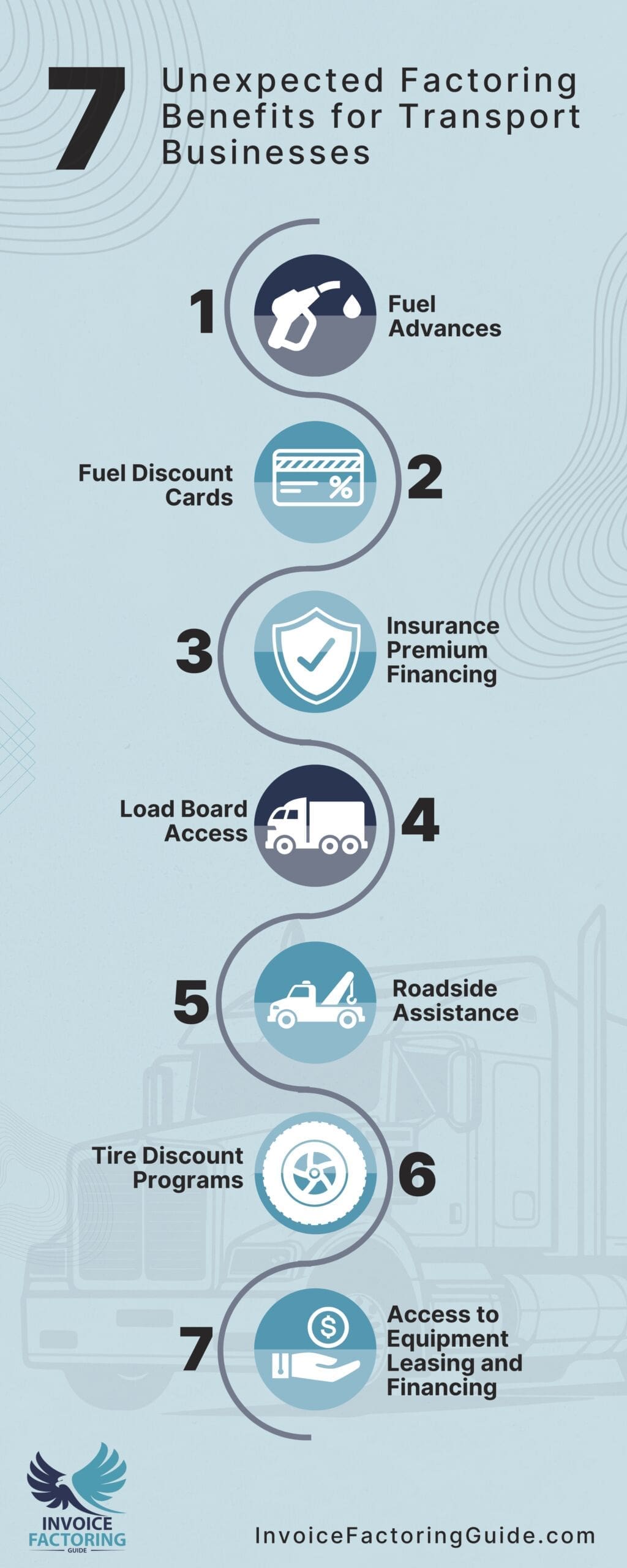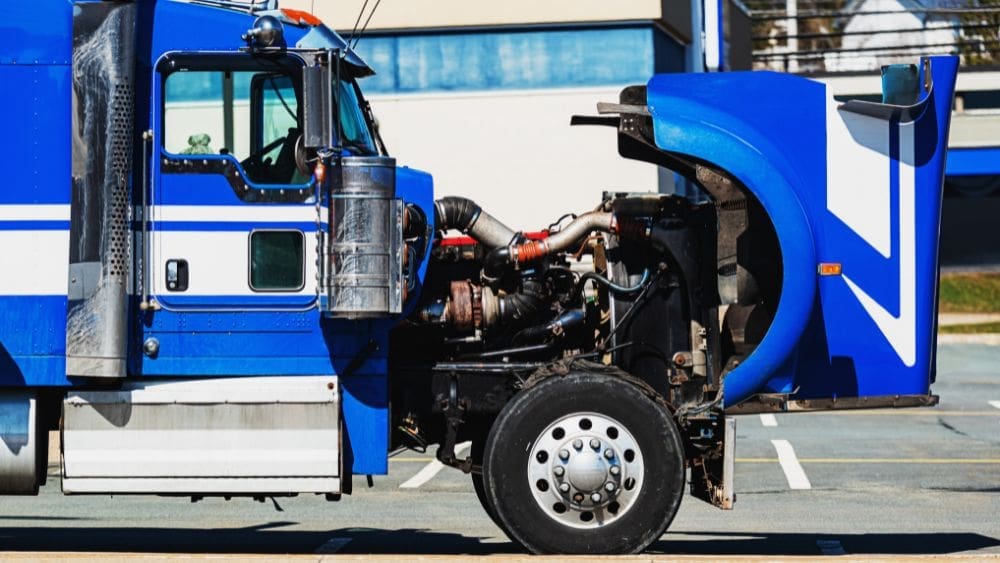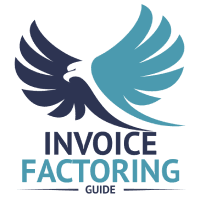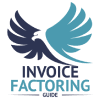
Running a commercial transport business comes with constant challenges. Margins are tight, and long waits for client payments can make it feel like you’re always one step behind. Meanwhile, your drivers need to be paid, fuel needs to be purchased, and equipment must be maintained—no matter what’s in your account. If this sounds familiar, you’re not alone. For businesses navigating these challenges in the Southeast, partnering with Florida factoring companies can provide the localized support and cash flow solutions needed to stay competitive in the region. Many transport businesses, just like yours, turn to factoring to bridge these cash flow gaps and keep growing. But did you know there are even more factoring benefits for transport companies than just improving cash flow? In the next few minutes, we’ll show you some unexpected perks that could make a real difference to your business.
Universal Benefits of Freight Factoring for the Transportation Industry
Invoice factoring can be a lifeline for businesses across industries, offering practical solutions to manage cash flow and streamline operations. Before diving into the transport-specific benefits, let’s take a moment to explore some of the universal advantages that factoring can bring to your business.
Improved Cash Flow
One of the most immediate benefits you’ll notice with factoring is the boost to your cash flow. Instead of waiting 30, 60, or even 90 days for clients to pay their invoices, factoring allows you to receive a significant portion of your invoice value—typically between 60 to 95 percent—upfront. This means you’ll have the working capital you need to cover operational expenses like payroll, fuel, and equipment maintenance without the stress of waiting for payments.
For example, if you run a trucking company in Georgia and are waiting for payment from a large shipper, factoring can help you bridge that gap, allowing you to keep paying drivers and maintaining your fleet without dipping into reserves or taking on debt. Similarly, industries with unique challenges, such as oilfield and construction services can also benefit from specialized factoring solutions designed to address sector-specific cash flow issues.
No Additional Debt
Unlike traditional loans or lines of credit, invoice factoring doesn’t add to your business’s debt. Instead, it’s based on the creditworthiness of your customers, not your own. If you’ve had trouble securing a loan due to weaker credit or simply want to avoid taking on more liabilities, factoring can be an ideal solution to keep your business moving forward.
Faster Growth
With a steady flow of cash, you can focus on growing your business without hesitation. In transportation, this might mean expanding your fleet, hiring more drivers, or taking on more routes—all without worrying about liquidity. Factoring enables you to seize opportunities as they arise, knowing you have the cash flow to support your next big move.
For example, a Michigan freight company that’s just been offered new shipping routes can use factoring to ensure they have the capital to expand, hire more drivers, or lease additional trucks—without waiting on delayed payments from clients.
Outsourced Collections and Invoice Management
Chasing down payments can be time-consuming and take your focus away from the core aspects of your business. Factoring companies often handle collections and invoice management for you, freeing up your internal resources. For businesses operating in Texas, working with factoring companies in Texas can streamline these processes, ensuring efficient cash flow management tailored to the region’s unique business environment. For transport companies with lean back-office operations, outsourcing these tasks can allow you to focus on what matters most: running your business.
Better Credit Control
Factoring companies typically offer credit checks on your clients as part of their service, helping you make informed decisions when extending credit to new customers. This means you can avoid taking on clients with poor payment histories and reduce the risk of bad debt, protecting your cash flow and ensuring smoother operations.
7 Unexpected Factoring Benefits for Transport Businesses

While the benefits we’ve covered are strong reasons to consider invoice factoring, the transportation industry comes with its own set of unique advantages. Factoring companies that specialize in transport understand the specific challenges you face, which is why they often provide extra perks designed to keep your business moving smoothly.
1. Fuel Advances
Fuel is one of the largest expenses for any trucking company, and waiting on customer payments can make it hard to keep your trucks on the road. That’s where fuel advances come in. Transportation-specific factoring companies offer this service to provide you with immediate cash advances on your loads so you can cover fuel costs upfront and keep moving without missing a beat.
How Do Fuel Advances Work?
- Load Confirmation: Once you’ve booked a load and have the necessary paperwork—like a bill of lading—you submit it to your factoring company.
- Advance Request: You can then request a portion of the invoice value, typically 40 to 60 percent, to cover fuel costs.
- Immediate Funds: The factoring company deposits the advance directly into your fuel card or business account, giving you quick access to funds so your drivers can fill up and hit the road.
- Invoice Submission and Payment: After the load is delivered, the invoice is submitted to the factoring company, and the remaining invoice amount—minus fees—is paid to you.
Why Does This Matter?
Fuel accounts for over a quarter of a trucking business’s expenses, according to the USDA. Not having cash on hand for fuel can seriously slow you down. For smaller operators especially, fuel advances can be the difference between taking on a job or turning it down. By using fuel advances, you can stay flexible and take on more work, even if your customers’ payments are delayed.
- Flexibility and Growth: Fuel advances give you the breathing room to take on more jobs, whether it’s during peak season or when new opportunities arise. If you’re typically running regional routes but have a chance to take on a long-haul delivery, fuel advances make it possible to cover the added fuel expenses without straining your cash flow.
- Risk Management: With fuel advances, you can confidently accept larger jobs, knowing that rising fuel costs or slow-paying clients won’t leave you in a bind. This financial flexibility is key to staying competitive and growing your business.
2. Fuel Discount Cards
Fuel expenses can eat into your profits fast, but with fuel discount cards, you can reduce those costs and keep more money in your pocket. These specialized cards, provided by transportation-focused factoring companies, offer substantial savings on fuel purchases at major truck stops across the country, helping you lower one of your biggest operational expenses.
How Do Fuel Discount Cards Work?
- Partnership Networks: Factoring companies partner with well-known fuel providers like Pilot Flying J, Love’s, and TA Petro to negotiate discounts for their clients. With access to thousands of fuel stations nationwide, you can take advantage of reduced prices no matter where your trucks are operating.
- Fuel Card Issuance: Once you partner with a factoring company, you’ll typically receive fuel discount cards for each driver or truck in your fleet. These cards work just like credit or debit cards but come with the added benefit of automatic discounts at the pump.
- Discount Application: Depending on your location and the partnerships your factoring company has, you could save anywhere from a few cents to over 40 cents per gallon on fuel. These discounts apply right at the pump or during payment, making it simple to lower your fuel costs.
- Fuel Management Tools: Many factoring companies also offer online tools to help you track fuel usage, monitor spending, and find areas for additional savings. These tools give you better visibility over your fleet’s fuel consumption and help you manage your budget more effectively.
Why Do Fuel Discount Cards Matter?
Fuel is a major expense for any trucking business, and every penny counts in an industry with tight margins. Fuel discount cards can help you reduce these unavoidable costs, freeing up capital for other essential areas like vehicle maintenance, payroll, or growing your fleet.
- Flexibility and Scalability: Whether you’re an independent owner-operator or managing a fleet of 50 trucks, fuel discount cards provide savings that scale with your business. No matter your size, these cards help you cut down on fuel expenses and keep your trucks running efficiently.
- Maintenance Discounts: Some cards even offer additional savings on maintenance services, allowing you to lower repair and service costs at major truck stops.
- Access to Rewards Programs: Beyond fuel savings, many cards offer rewards like free showers, meals, or other amenities at truck stops. These perks can go a long way in keeping your drivers satisfied and helping with driver retention.
Fuel Cards and Cash Flow
Fuel discount cards are often paired with the broader cash flow benefits of factoring. With immediate cash flow through factoring, you can further leverage these fuel savings to grow your business without the stress of waiting on customer payments.
3. Insurance Premium Financing
Insurance costs can put a major strain on your budget, especially in an industry as high-risk as transportation. With insurance premium financing, you can spread the cost of your annual premiums into manageable monthly payments instead of paying the full amount upfront. Many transportation-focused factoring companies offer this service as part of their financial tools, helping you keep your cash flow steady while staying fully insured.
How Does Insurance Premium Financing Work?
- Insurance Selection: As a trucking business, you’re required to carry several types of insurance—liability, cargo, and physical damage—all of which can be expensive. If you’re faced with a high premium, it can be difficult to come up with the full payment upfront.
- Financing Arrangement: Instead of paying all at once, your factoring company or a specialized financing partner pays the premium on your behalf. This allows you to finance the cost over time.
- Monthly Payments: You then repay the factoring company in more affordable monthly installments over the course of the year. These payments include a small financing fee, but they allow you to preserve cash for other critical expenses like fuel, payroll, or vehicle maintenance.
- Integrated with Factoring: In many cases, these monthly payments can be automatically deducted from your factoring disbursements, streamlining the process and helping you avoid missed payments.
Why Does Insurance Premium Financing Matter?
Trucking insurance is a big-ticket expense, with liability coverage alone ranging from $5,000 to over $12,000 per year for just one truck. When you add in other coverages, the costs can skyrocket, making it tough to manage, especially for smaller or growing companies. Insurance premium financing gives you breathing room by breaking these large expenses into manageable payments, keeping your cash flow healthy without sacrificing coverage.
- Risk Management and Compliance: Insurance isn’t just a legal requirement—it’s essential for protecting your business from the risks associated with accidents, theft, or damage. By financing your premiums, you can ensure your business remains compliant with regulations and avoid the potential legal or financial setbacks that come with being underinsured or missing payments.
- Cash Flow Preservation: Perhaps the biggest benefit of insurance premium financing is that it helps you maintain a steady cash flow. By spreading out your payments, you’ll have more liquidity for unexpected costs, growth opportunities, or even emergencies, ensuring you can continue running your business smoothly.
4. Load Board Access
Finding consistent freight is one of the toughest challenges for any trucking business, especially for smaller operators and independent owner-operators. That’s where load boards come in. Factoring companies often include access to these boards as part of their service, giving you an easy way to find new loads, reduce deadheading, and keep your trucks on the road.
How Does Load Board Access Work?
- Subscription to a Load Board: Factoring companies that specialize in transportation often provide free or discounted access to paid load boards. These boards list thousands of available loads each day, covering a wide range of routes, cargo types, and rates.
- Real-Time Load Matching: Once you’re connected to a load board, you can search for loads that match your location, equipment, and preferred routes. The platform also allows you to post your truck’s availability, so brokers and shippers can find you directly.
- Filter and Search Tools: Load boards are equipped with advanced search and filter options, allowing you to find the best loads in real-time. You can filter by destination, rate, type of cargo, and urgency, making it easier to focus on the most profitable or strategically important loads.
Why Does Load Board Access Matter?
For smaller trucking companies and owner-operators, finding steady work is a constant challenge. Downtime means lost revenue and higher operating costs, but access to a load board can help you maximize truck utilization and keep your business moving.
- Maximize Truck Utilization: With access to a load board, you can continuously find new freight and keep your trucks on the road, helping you generate more consistent revenue.
- Avoid Deadheading: Load boards let you plan more efficient routes and find backhauls to avoid driving empty, saving on fuel and reducing wear and tear on your trucks.
- Increase Profitability: By giving you control over the loads you choose, load boards help you prioritize higher-paying routes, boosting your profitability.
- Competitive Advantage: Load boards open up new opportunities for partnerships and recurring business. You might secure regular lanes from large shippers or find new growth opportunities. Additionally, access to real-time data on freight rates helps you negotiate better deals and stay competitive in a constantly shifting market.
- Flexibility for Small Operators: If you’re a smaller business or an independent owner-operator, a load board can level the playing field. You gain access to the same freight opportunities as larger companies, even if you don’t have established relationships with brokers or direct contracts with shippers.
5. Roadside Assistance

Breakdowns and mechanical issues can stop your trucks in their tracks, leading to lost revenue and frustrated clients. That’s why many transportation-focused factoring companies offer roadside assistance programs designed to get your vehicles back on the road as quickly as possible. These programs cover services like towing, tire changes, fuel delivery, and even minor repairs, so your business can keep moving.
How Does Roadside Assistance Work?
- Factoring Partnership: Factoring companies often partner with nationwide roadside assistance providers, offering 24/7 help for your trucks. These services are typically included in your factoring agreement or available at a discounted rate.
- Immediate Assistance: When one of your trucks breaks down, the driver can contact the roadside assistance provider for immediate help. No matter where or when the issue occurs, help is dispatched to minimize downtime and get the truck moving again.
- Comprehensive Services: Roadside assistance programs often include:
- Towing: If your truck can’t be repaired on the spot, it’s towed to the nearest repair facility.
- Tire Changes: Got a flat tire? Roadside assistance will send help to replace or repair it.
- Fuel Delivery: Run out of fuel in a remote area? Fuel can be delivered directly to the truck.
- Battery Jump Starts: If the truck’s battery dies, the service can jump-start the vehicle.
- Minor Mechanical Repairs: Some providers offer on-site repairs for minor issues, getting your truck back on the road faster.
- Discounted or Free Services: Many factoring companies either cover the cost of these services or offer them at a discounted rate, helping you avoid expensive out-of-pocket emergency costs.
Why Does Roadside Assistance Matter for Transport Businesses?
Every minute a truck is off the road due to a breakdown, your business loses money. Delays can damage your reputation, lead to missed delivery windows, and even result in penalties from clients. Roadside assistance helps you avoid these costly disruptions and gets your trucks back on the road quickly—especially important for small and mid-sized companies without extensive internal repair resources.
- Reducing Downtime and Minimizing Costs: In trucking, time is money. Every hour a truck is sitting on the side of the road means potential revenue lost. Roadside assistance reduces the downtime associated with breakdowns, helping you avoid the steep costs of emergency services like towing and long-distance repairs. With factoring companies offering discounted or free services, you can protect your cash flow and keep your business profitable.
- Enhancing Driver Safety and Satisfaction: Roadside assistance doesn’t just benefit your business—it’s also essential for driver safety. Breakdowns in remote or unfamiliar areas can put drivers at risk, but a reliable roadside assistance program ensures they aren’t left stranded for long. This peace of mind can also boost driver satisfaction, making them feel safer and more secure on the job. In an industry where driver retention is a challenge, offering this kind of support can give your company a competitive edge.
6. Tire Discount Programs
Tires are one of the biggest ongoing expenses for trucking companies, especially with the wear and tear caused by heavy loads and long hauls. That’s why factoring companies often provide tire discount programs, helping you purchase tires at reduced prices from major manufacturers and retailers. These programs make it easier to keep your fleet in top shape without breaking the bank.
How Do Tire Discount Programs Work?
- Factoring Partnership: Many factoring companies partner with well-known tire manufacturers like Goodyear, Michelin, and Bridgestone, as well as major truck stop chains. These partnerships allow you to access significant discounts on tire purchases through the factoring company’s network.
- Discount Application: If you’re enrolled in a factoring service that offers tire discounts, you can buy tires at participating tire shops or online, with discounts applied directly at the point of sale.
- Additional Services: Some tire discount programs also offer additional services like regular tire maintenance, warranties, and retread options. This means you’ll not only save on tire purchases but also reduce long-term maintenance costs.
- Nationwide Coverage: Whether you’re driving cross-country or staying local, factoring companies’ partnerships with national tire retailers and service centers ensure you can access these discounts no matter where your trucks are.
Why Do Tire Discount Programs Matter?
Tires are a huge expense for any transport business, but with a tire discount program, you can manage those costs more effectively while maintaining your fleet’s safety and performance.
- Cost Savings on New and Retread Tires: One of the biggest perks is the ability to save on both new and retread tires. Depending on the manufacturer and program, you could save anywhere from ten to 30 percent on new tires. Retread tires, a common and cost-effective choice in the industry, are also available at discounted rates.
- Consistent Fleet Maintenance: Regular tire replacement is key to safety, fuel efficiency, and compliance with DOT regulations. Tire discount programs help you keep up with fleet maintenance without worrying about high upfront costs, making it more likely you’ll replace worn-out tires on time, reducing the risk of blowouts or accidents.
- Fuel Efficiency: Well-maintained tires can significantly improve your fuel efficiency. Proper tread and inflation can save you money at the pump, meaning tire discounts not only reduce tire costs but also help lower your fuel expenses over time.
- Nationwide Convenience: Whether your drivers are passing through rural areas or stopping at major truck hubs, tire discount programs give you nationwide access to quality tires at discounted rates. This is especially beneficial for long-haul operations that cross state lines and need reliable tire services no matter where they are.
7. Access to Equipment Leasing and Financing
The transportation industry is capital-intensive, and acquiring new trucks, trailers, and other essential equipment can strain your budget. Factoring companies often offer equipment leasing and financing options, allowing you to spread out the cost over time and preserve your cash flow for day-to-day operations.
How Does Equipment Leasing and Financing Work?
- Leasing Option: When you lease equipment, you’re essentially renting it for a set period, usually between 24 and 60 months. At the end of the lease, you can either return the equipment, renew the lease, or sometimes buy the equipment at a reduced price. Leasing is ideal if you need to upgrade frequently or want to avoid the long-term commitment of ownership.
- Financing Option: If you prefer to own the equipment, financing allows you to buy it upfront and pay for it over time in monthly installments. This option is often used by businesses that want to build long-term assets.
- Partnering with Factoring Companies: Many factoring companies partner with equipment financing specialists or offer these services directly. This gives you an integrated solution where you can manage both your working capital and equipment needs under one umbrella.
- Tailored Payment Plans: Equipment financing typically comes with flexible payment plans tailored to your cash flow. Payments can sometimes be adjusted based on your business’s financial performance, making it easier to manage during slower seasons.
Why is Access to Equipment Leasing and Financing Important?
For trucking businesses, equipment costs can be substantial. A new semi-truck might cost anywhere from $100,000 to $200,000, and trailers range from $20,000 to $50,000. Small and medium-sized businesses often struggle to cover these costs upfront, especially when they’re waiting on customer payments.
- Preserve Cash Flow: Leasing or financing equipment allows you to spread out large expenses over time, keeping more cash available for essential expenses like fuel, payroll, and maintenance. Instead of tying up capital in one large purchase, you can make manageable monthly payments.
- Ability to Scale and Expand: If your business is growing, you’ll need to expand your fleet or upgrade old equipment to stay competitive. Leasing and financing options let you do that without the burden of a massive upfront investment, so you can take on more clients and enter new markets.
- Keep Up with Technology and Regulatory Changes: With equipment constantly evolving, leasing allows you to upgrade more frequently and stay compliant with new regulations. Whether it’s emissions standards or safety features, leasing ensures you’re not stuck with outdated equipment that might lose value quickly.
- Tax Advantages: Leasing can also offer tax benefits, as lease payments are often considered an operating expense and can be deducted from your taxable income. If you choose to finance equipment, you can typically depreciate its value over time, providing additional tax savings.
- Reduce Maintenance Costs: Leased equipment often comes with maintenance plans included, so you can reduce your maintenance costs. The leasing company may handle repairs and even part replacements, reducing downtime and keeping your fleet operational. If you finance your equipment, warranties and service agreements are usually bundled into the financing plan, helping you avoid surprise repair costs.
How Freight Factoring Helps Trucking Businesses Manage Relationships with Freight Brokers
Freight factoring companies can play a crucial role in helping trucking businesses foster stronger relationships with freight brokers. By converting freight invoices into immediate cash through the factoring work process, trucking companies are able to get paid faster without waiting for outstanding invoices to be cleared. This not only ensures that business expenses such as fuel, payroll, and equipment maintenance are covered, but also enables trucking businesses to offer quicker payments to brokers—strengthening trust and reliability between partners.
Unlike applying for a bank loan or a traditional business loan, freight invoice factoring does not depend on your credit score or credit history. Instead, factoring uses your accounts receivable to provide the cash you need quickly, without adding new debt. This can be a game-changer for new businesses and smaller transportation companies that need fast access to working capital.
Additionally, using non-recourse factoring gives brokers peace of mind by mitigating the risk associated with unpaid invoices. This means the factoring company assumes the credit risk, reducing the financial burden on trucking companies. In the end, factoring gives businesses the ability to manage their cash flow effectively, cover operational expenses, and maintain positive cash flow—all of which are key components of building and maintaining positive relationships with freight brokers.
The cost of factoring, which usually includes a factoring fee, is offset by the benefit of having ready access to cash. Unlike waiting for clients to pay or dealing with the delays that can come with securing a bank loan, trucking factoring ensures that you have the liquidity needed to meet your business needs. Moreover, many freight factoring companies offer additional perks like free credit checks on clients, helping you to minimize risks and make informed business decisions.
Connect with an Experienced Transportation Factoring Company
Maximizing the benefits of factoring is all about finding the right partner. By working with a factoring company that understands the unique needs of the transportation industry, you can take full advantage of perks like fuel advances, tire discounts, and more. We’re here to help you find the best match for your business. Simply request a complimentary quote to get started.
FAQs on Factoring Benefits for Transport Businesses
How do fuel advances work in transportation factoring?
Fuel advances give trucking companies upfront funds to cover fuel costs before they deliver a load. After securing a job, businesses submit documentation to the factoring company, which then provides a percentage of the invoice value for fuel. This ensures trucks stay on the road without cash flow interruptions.
Can fuel discount cards help reduce trucking expenses?
Yes, fuel discount cards provided through factoring partnerships offer substantial savings at major truck stops. Trucking companies can save 10-40 cents per gallon, significantly reducing fuel expenses. These cards also provide additional perks like maintenance discounts and rewards, making them a key cost-saving tool for transport businesses.
What is insurance premium financing for trucking businesses?
Insurance premium financing allows trucking companies to spread out the cost of expensive annual insurance premiums into affordable monthly payments. Factoring companies pay the insurance provider upfront, and businesses repay the factoring company in installments. This preserves cash flow and ensures companies remain compliant without large upfront expenses.
How can load board access benefit my trucking company?
Load boards connect trucking companies with available freight loads, helping them find jobs, reduce downtime, and avoid deadheading. Factoring companies often provide free or discounted load board access, allowing transport businesses to secure consistent work, optimize routes, and maintain steady cash flow.
What does roadside assistance cover for transport businesses using factoring?
Roadside assistance through factoring companies typically covers services like towing, tire changes, fuel delivery, and minor mechanical repairs. Available 24/7, this service helps trucking businesses minimize downtime due to breakdowns and ensures drivers stay safe while on the road, reducing costly delays.
Are tire discount programs available for trucking companies through factoring?
Yes, tire discount programs provided by factoring companies offer significant savings on both new and retread tires from major brands. These programs help trucking businesses reduce maintenance costs, ensuring their fleets remain operational and safe while lowering one of the industry's largest ongoing expenses.
How can equipment leasing and financing help grow a transport business?
Equipment leasing and financing allow trucking companies to acquire trucks, trailers, and other equipment without large upfront costs. By spreading payments over time, businesses can preserve cash flow, scale operations, and upgrade equipment more frequently, supporting long-term growth and profitability.
Is invoice factoring a good solution for improving cash flow in the transportation industry?
Yes, invoice factoring provides immediate cash by advancing payments on invoices, bridging the gap between billing and customer payment. This ensures transport businesses have the working capital needed to cover operational expenses, helping them avoid cash flow shortages and grow more consistently.
What additional services do transportation factoring companies offer besides cash flow solutions?
In addition to improving cash flow, transportation factoring companies often offer services like fuel advances, fuel discount cards, insurance premium financing, load board access, roadside assistance, tire discount programs, and equipment leasing and financing, helping businesses reduce costs and enhance operational efficiency.
Can government contractors use transportation factoring?
Yes, government contractors can use transportation factoring to improve their cash flow while waiting for payments on government contracts. Factoring allows contractors to receive upfront payment for invoices, helping them cover operational expenses without delays. Learn more about how transportation factoring benefits government contractors.
How do I know if my business qualifies for state-specific factoring services?
To qualify, your business must have valid invoices with creditworthy customers, whether they are in South Carolina, Michigan, or any other state. Different factoring companies may specialize in various industries and regions, so it’s essential to work with a provider familiar with your state’s business landscape.

About Invoice Factoring Guide
Related Articles
Get an instant funding estimate
Results are estimates based on the calculated rate and the total invoice amount provided.
Actual rates may vary.
Request a Factoring Rate Quote
PREFER TO TALK? Call us at 1-844-887-0300










